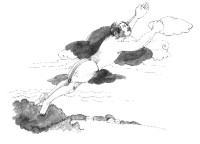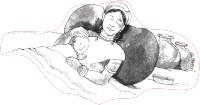Story
From the Galpoghor Series:
Children of the Wind
Continued from the last issue
 ‘I shall have to go,' he said one day to Aminata. 'They are waiting for me.' ‘I shall have to go,' he said one day to Aminata. 'They are waiting for me.'
'Who is waiting?' she asked, surprised.
'The rains.'
'You are hiding something from me, aren't you?' she enquired.
'I must, I fear.'
'Won't you even tell your wife?" she said in tears.
'I cannot tell it to a soul.'
'Won't you even tell your wife?' she said in tears.
'I cannot tell it to a soul.'
'Then why tell me false, that the rains are waiting for you?"
'But that is true, Aminata. The herring gulls have told me. I must open the way for the new season, warn the village eleders who already feel it in their bones; I must act as herald to the fertile lands. And I am already late. Farewell, Aminata. It will not be long before I'm back. I'll take you by surprise one evening, when my day's work is done. I shall come for you beside the water where I first met you.'
'Will you send me news?' she asked.
'Yes, I shall, by the fisherman Abbege who knows my name; and of an evening I will talk to you through the trees, caress you in the soft dawn breeze. You will hear me singing in the boughs, "Frish, frish!"
'Frish,' murmured the girl fondly.
That is how Wind took a wife and in the passing of the years had three fine children. The first child was a boy named Mamadu Marta, the second a girl, by name Binetu; the last born was a second son, Alama.
Never were children seen so lithe and light as they were.
In the meadows where the washerwomen spread their linen on the grass to dry they would rush about until they were quite out of breath; every time they passed, they made the clothes blow to and fro. They would wander through the forest, blowing with all their might inot the bushes, putting to flight the dune partridge and leading deer astray with their mischievous gusts of wind. The eldest, whose lungs were like a backsmith's beloows, would accompany old Abbege to the fishing grounds.
'Frish, frish!' the old fisherman would cry.
And Mamadu Marta would come rushing over the horizon, leaping into the dhow's stern and blowing the sail fit to tear the canvas.
Binetu learned singing from birds and crickets and would sing for hours as she walked through fields of flowers, gathering golden sunbeams and scattering them to the breeze. Her breath was fragrant with thyme and mint and mayflower. In Aminata's garden there grew pretty flowers which her daughter brought from far and near, and encouraged to grow with her songs.
Her father called the songs the Wind of Flowers, when his journeys brought him to the People's village and he stayed there for a while. Then Aminata was so happy. He would spend a night with her and tell the little ones stories from the Lands of the Orange Sunset. Throughout the long night, boats would be becalmed on the still sea, dead leaves would never fall from branches and over the world reigned an eerie silence which soil, water and grass all found hard to bear-except at Maca where it seemed but a short pause before Wind began another story to his childen and blew gently on the embers in the hearth.
For a few years Wind had come back at every change of season. Adn then, when Aminanta was awaiting her third child, between the rains and the arid season, Wind did not come. The Sun Burned down upon the bushland, yet at Maca there was still no sign of the foot-weary wanderer. This was the time when in a distant land across the seas, where the dragon is the royal beast, there was much misery and countless wrecks at sea, and a great flood which wore away the Earth right down to the bed rock. In that dragon country, Wind used up his anger at having to stay while they were waiting for him in Maca.
Until the end Aminata still hoped to see the one who had forsaken the love of the People's daughter, and she died after giving birth to her third child, the most beautiful of all. He had deep black eyes, almost violet in colour, and his laugh was soft and wistful like his mother's.
Aminata held him to her breast till her last breath, talking to him as if he could understand- as no doubt he did - telling him the prayer which eases death, yet still hoping for a miracle that would bring back her husband whom she loved so dearly.
All that long night of waiting Abbege stayed by the river bank, calling, 'Frish, frish! Come, come,' as if he knew the secret of the Wind and Aminata.
'He will surely come,' thought Aminata, looking at her baby. 'My baby, my little baby, who will never know me, do you sense the pain that's in my hear? Tonight it beats with all the sorrow of the world; its echo runs all through my body. Listen. How sadly the Wind moans outside. From far away he brings the cry of all who suffer here on Earth. My little baby, remember later, when you're a man: I can feel within me everything that suffers and dies without a comfort. Oh, my son, how long the Wind is in coming.'
Deep suffering opens up the heart; that is what made the third child of the Wind so tender-hearted.
Old Abbege reported later that towards the dawn he saw a big white seagull pass low over the water issuing a heart-rending cry and heading for the village. When he went up to the village and pushed open Aminata's door, he swore he saw the seagull standing on one leg and looking at the child.
This is what he heard, 'You have come back, handsome nomad of my dreams. I grieve no longer, now that you are here.'
'Yes, I am here, Aminata.'
'My suffering is at an end,' she sighed. 'the world for me falls silent. How deeply I have suffered all this night.'
'Every night and every day, dear Aminata.'
'Farewell, Frish, I love you dearly,' were her last words.
Abbege never doubted for a moment that the white seagull was the wind who, unable to change his shape in time, had come winging to Aminata to bring her one last ray of joy. Then the old man began calling through the village.
'Women, Aminata is dead. Do you not hear across the
village.
'Women, Aminata is dead. Do you not hear across the bush the singing of the reed-pipes, drums and wooden flutes? Misfortune has come. Go, women, to Aminata's - there is a baby crying.'
In the villages of that land there is a custom that if a baby's mother dies, the nearest neighbour must fetch the child and bring it up as if it were her own.
'We'll call him Alama,' said the weaver's wife, as she wrapped him in her cloth.
Meanwhile, the while seagull circled for some moments above the village, then turned and flew straight out to sea.
 Wind's second son grew up a sturdy boy. His childhood was that of any normal child in a river village, save that he used not to play with other children of his age. He liked to wander by himself within the jungle, befriending baby birds who'd fallen from their nests. He was a lonely boy, yet kind and gentle. For if he came upon an ailing person stretched out upon a straw bed, he always had a word that brought a gleam of joy into the eyes. Alama's words soothed pain like balm; he knew the flowers in Binetu's garden whose roots had power to put pain to sleep and quieten the soul. Wind's second son grew up a sturdy boy. His childhood was that of any normal child in a river village, save that he used not to play with other children of his age. He liked to wander by himself within the jungle, befriending baby birds who'd fallen from their nests. He was a lonely boy, yet kind and gentle. For if he came upon an ailing person stretched out upon a straw bed, he always had a word that brought a gleam of joy into the eyes. Alama's words soothed pain like balm; he knew the flowers in Binetu's garden whose roots had power to put pain to sleep and quieten the soul.
River Wind, Flower Wind, and Wind of Mercy. These were the names of Wind's three children. All of them one day flew away from their village home. To the first, Wind of the Rivers, his father gave the realm of meandering brooks, rivers, streams and swamps. Old Abbege's sons always whistle for him when the kingfisher calls. The girl Binetu, Wind of the Flowers, haunts the fields and woods, and everyhere she goes she brings warm spring days, fruit in autumn, and on hot days, when the air shimmers in the sun, it is she who tosses up those little glittering grains of gold which are neither flower nor insect.
Alama, the last has the most beautiful realm of all. He gently rocks and comforts and lulls the sadness of the world, he sings for those who mourn, he brings a breath of joy and a soothing caress. it is he who gives the signals for the prayers of People down on Earth.
Do not refuse to sing for him when, in a soft whisper, he seeks your help to cheer the sick and poor.
The End
(Retold by James Riordan)
Copyright
(R) thedailystar.net 2007
|
